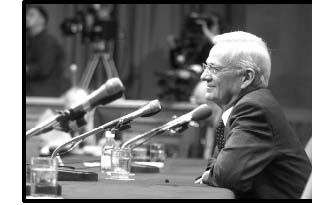

|

|

|

|
| |
|
|
|
The early reviews are in on the new George W. Bush administration. It has all the elements of the classic horror story: a predictable plot, familiar villains and an unshakable sense of déjà vu. On the following pages, we take a look at Bush's nominees and appointments, a diverse cast of characters in every way but ideology. Left to their own devices, this collection of unrepentant cold warriors, anti-choice extremists, Wise-Use desperados and corporate shills (as well as a couple of reasonable old-fashioned conservatives) could make for a harrowing next four years. Can the forces of good thwart this evil plan? Well, as In These Times went to press, thousands of townspeople were taking their torches to Washington to protest Dubya's inauguration, making one thing clear: There will be no honeymoon! Craig Aaron
Treasury Secretary-nominee Paul O'Neill can perhaps best be viewed as a throwback to the old-fashioned breed of "enlightened industrialists" who occupied the halls of power back in the '50s and '60s. O'Neill was the CEO of aluminum giant Alcoa from 1987 to 1999. Prior to that he was
When O'Neill took over at Alcoa, he announced that workplace safety would be a top priority. According to the Steelworkers, this was more than just rhetoric. Alcoa's safety record improved significantly during his tenure, and is now the best in the aluminum industry. George Becker, the union's president, describes O'Neill as "a man you can trust and believe what he says." O'Neill also has at least paid lip service to environmental concerns throughout his tenure at Alcoa. In the early '90s, he was on record as supporting an increase in gasoline taxes. Alcoa has taken real steps to reduce its emissions of pollutants, which O'Neill claims has saved the company money. In 1996, Alcoa received an award from the World Environment Center (WEC), a corporate-backed environmental group that also receives substantial government funding, as the world's most environmental company. (Alcoa also has given significant contributions to the WEC.) However, there are real limits to O'Neill's environmentalism. In 1998, he gave an address to the Aluminum Association, in which he warned of the serious threat posed by global warming, comparing it to the Holocaust. But rather than endorsing the Kyoto agreement, he also called for more research to determine the extent of the problem. (The aluminum industry, as a huge consumer of energy, is a major source of greenhouse gas emissions.) And according to the Environmental Defense Fund, some Alcoa plants rank among the worst in the country in several categories. In addition, Alcoa has been at the forefront of efforts to recycle industrial waste as fertilizer, a plan that raises serious concerns about food safety. One affiliation that may best characterize O'Neill's political leanings is his membership in the American Assembly, an organization started by Dwight Eisenhower, prior to his presidency, "to illuminate issues of public policy." It was intended to bring together leaders from various parts of society to think about the major problems facing the nation. A recent report from the group on the problems of inner cities included recommendations for expanding the earned income tax credit and increased government support for childcare. It is worth noting that O'Neill's experience as the CEO of a major industrial corporation will bring a different perspective to Treasury. Recent occupants of this position have been more strongly associated with finance than industry. As a result, O'Neill may have somewhat more regard for the concerns of domestic manufacturing than his predecessors. Also, in a time when many people in business and politics have come to view the labor movement as a historical relic, it will be a change to have a secretary who has developed a constructive working relationship with a major union. (Though there have been complaints raised about working conditions at Alcoa's plants in Mexico.) O'Neill may also be somewhat less committed to international financial
institutions such as the IMF and World Bank, which the Clinton team
viewed as central to their agenda. In recent months he has been
critical of the Federal Reserve Board, warning that its interest-rate
hikes could choke off growth. While he is friends with Alan Greenspan,
O'Neill may be more willing to publicly criticize his actions than
the Clinton Administration has been. That would be a welcome change.
|


